Some Politicians Delayed Revival Of Nuclear Deal – Iranian Lawmaker
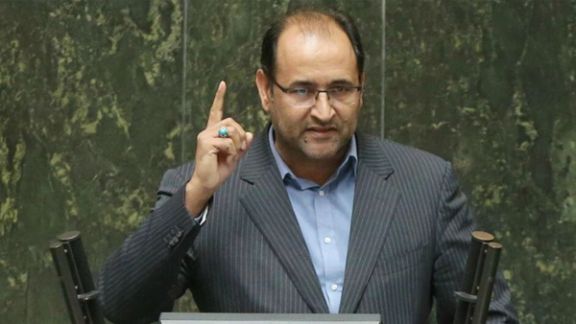
An Iranian lawmaker says some politicians unnecessarily delayed an agreement to revive the 2015 nuclear deal (JCPOA), hurting ordinary people’s livelihoods.

An Iranian lawmaker says some politicians unnecessarily delayed an agreement to revive the 2015 nuclear deal (JCPOA), hurting ordinary people’s livelihoods.
Jalil Rahimi Jahanabadi, member of the Iranian parliament’s foreign policy and national security committee, told local media that the same people who were tearing up the JCPOA in recent past now completely agree with its revival.
Rahimi was implicitly referring to hardliners who during the presidency of Hassan Rouhani opposed the agreement his government had concluded with world powers in 2015.
The lawmaker said that opposition to the deal was driven by political motives. He retorted that some politicians “did not want the previous government to restore the agreement. They wanted to be the ones to do it.”
Rahimi, a Sunni Muslim and a two-term parliament member, told the former opponents of JCPOA that they have to answer to the people as “why they did that to their livelihood.”
The US left the JCPOA in 2015 and imposed crippling sanctions on Iran.
Tehran began talks in April 2021, and could have reportedly concluded an agreement to revive the deal, but it was delayed until presidential elections in June 2021 when it was all but certain that hardliner Ebrahim Raisi would be elected.
Five months after the election, the new government dominated by the hardliner camp returned to negotiations in Vienna.
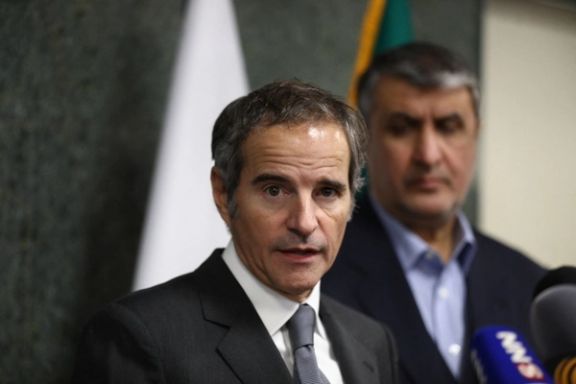
Iran’s nuclear energy chief said Wednesday Tehran expected the International Atomic Energy Agency (IAEA) to end its enquiries into unexplained uranium traces.
Mohammad Eslami, head of the Atomic Energy Organization of Iran, was reiterating an existing stance, but his comments came after a senior United States official told Reuters Monday that Iran had dropped a demand that the IAEA shelve its investigation as part of reviving the 2015 Iran nuclear deal, the JCPOA (Joint Comprehensive Plan of Action).
“We don’t expect the director general of the agency [Raphael Mariano Grossi] to utter sentences that are wanted by the Zionist regime,” Eslami told Fars News. “We have sent our written protest through our permanent representative in the agency [Iran’s ambassador to United Nations organizations based in Vienna]. Whatever has transpired in these negotiations is aimed at ending these claims before carrying out JCPOA commitments.”
With Iran’s 16-month talks with world powers at a delicate stage, Iran has cited a December 2015 precedent when the agency published a ‘final’ report on its pre-2003 nuclear work. Tehran says the agency’s further enquiries into this work, which led to inspectors finding uranium traces, came only after then Israeli prime minister Benjamin Netanyahu in 2018 made allegations based on documents he said were removed by Israeli intelligence from Iran.
Grossi – backed by France, Germany, the United Kingdom, and the United States – has argued that, regardless what happens over the JCPOA, Iran must satisfy the IAEA over these uranium traces purely as part of its ‘safeguards’ commitments under the Nuclear Non-Proliferation Treaty.
Grossi ‘hopeful’ on ‘filling in gaps’
In an interview with NPR Tuesday, Grossi said he was “hopeful” Iran would explain the presence of the uranium. “They know they have to do it, we have agreed on a mechanism,” he said. “My legal obligation is to ask the question.”
Grossi said it was a “political question” as to whether adequate explanations were needed before there could be agreement on reviving the JCPOA. The IAEA chief stressed the need for “maximum levels of access and inspection,” which Iran has restricted since 2020 following the US withdrawal in 2018 from the JCPOA. Under the JCPOA, Iran was required to accept more intrusive inspections, including implementation of the ‘additional protocol.’
“If the IAEA is allowed to do our inspection work, we are going to get there – I’m pretty confident,” Grossi said. The director general noted the IAEA had lost “continuity of knowledge” when Iran in June removed 27 cameras from nuclear manufacturing sites and storage facilities that had been installed after the JCPOA.
“If and when the agreement is revived and we can reconnect the cameras, we’ll have to sit down with our Iranian colleagues and see how we can fill in the gaps,” Grossi said. “If we have the correct access, the inspectors of the IAEA will always be in a position to detect in a timely manner any deviation of nuclear material…”
Associated Press reported Wednesday that the US would later today respond, presumably through the European Union, to an Iranian response made August 15 to EU proposals circulated August 8 to bridge remaining gaps over restoring the JCPOA.
While contents of the EU-mediated exchanges have been confidential, claims and reports have emerged over various stumbling blocks. As well as the IAEA probe, these include Iran’s demand for nuclear and economic ‘guarantees’ should the US again leave the JCPOA.
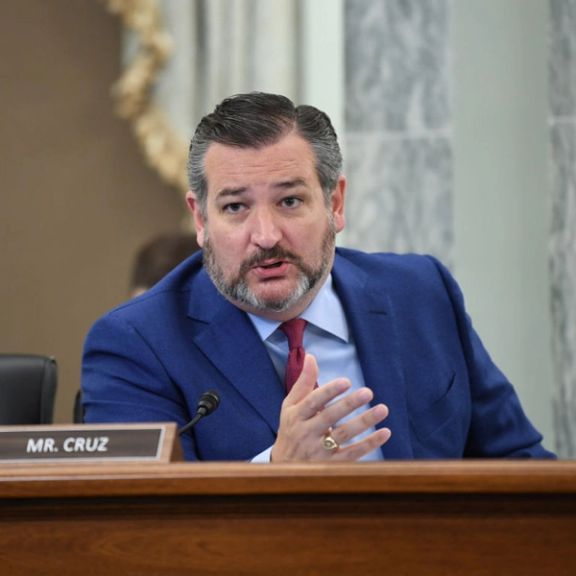
Several US Republicans have expressed their concerns about the apparently imminent agreement with Iran to revive the 2015 nuclear accord.
Texas Senator Ted Cruz said on Tuesday that "This deal will quickly flood the regime with hundreds of billions of dollars and soon afterwards the deal will be worth trillions. It will dismantle sanctions on Iran economy, which is controlled by IRGC, and provides IRGC with resources it needs to export its terror globally."
He said that “the Iranian regime violated the last nuclear deal, violated their most fundamental nuclear obligations beyond the deal, and violated international norms against nuclear proliferation. This deal will excuse Iran from that previous cheating, while enabling it to continue into the future.”
Reiterating his intention “to systemically fight the implementation of this catastrophic deal” Cruz added that he “will work with my colleagues to ensure that is blocked and eventually reversed in January 2025," referring to the date the next US administration assumes office. "A year ago, Biden gave Afghanistan to the Taliban. Now he intends to give a nuclear arsenal to Iran. The details of this deal are only now emerging, but we already know they'll be catastrophic to the national security of the US and allies and to the safety of Americans."
Expressing concern over a lack of recent engagement with Congress on reviving the JCPOA, Texas Representative Michael McCaul wrote to President Joe Biden to demand that Congress be given a chance to review any agreement to revive JCPOA.
Indiana's representative Jim Banks said, “Biden can't stop Congress nor a future GOP admin from reimposing Iran sanctions.” “If Iran is looking for 'guarantees,' I guarantee conservatives will work to reverse any of Biden's sanctions relief.”
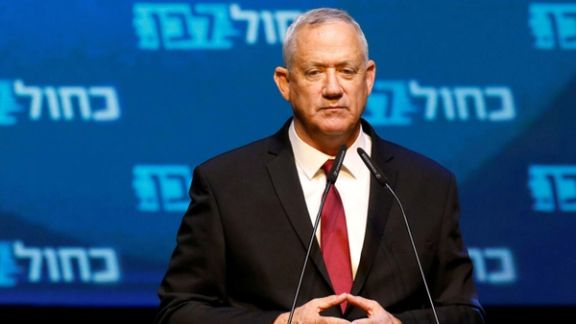
The Israeli premier has called on Washington to refrain from signing a nuclear agreement with Iran while the country’s defense minister is set to travel to the US to meet senior American officials.
Defense Minister Benny Gantz will depart for an official visit to the US and Japan on Thursday August 25, his office said on Tuesday, adding that in the US, Gantz will hold a series of meetings at CENTCOM headquarters in Florida and meet with National Security Advisor Jake Sullivan in Washington, DC. Israel's National Security Adviser Eyal Hulata is also in Washington.
Also on Tuesday, Naftali Bennett urged President Joe Biden to refrain “even now at this last minute” from reviving the 2015 nuclear deal (JCPOA). “This agreement will send approximately a quarter of a trillion dollars to the Iranian terror administration's pocket and to its regional proxies, and will enable Iran to develop, install and operate centrifuges, with almost no restrictions, in a mere two years,” he tweeted.
Expressing hope to dissuade the US from restoring the nuclear accord with the Islamic Republic, he said, “Throughout the past year, even when it was very close, we successfully convinced our White House counterparts not to give in to Iranian demands.”
Reiterating Israel’s opposition to the deal with Iran, Bennett noted, “Israel is not committed to any of the restrictions stemming from the agreement and will utilize all available tools to prevent the Iranian nuclear program from advancing.”
There have been clear signs in recent days that EU proposals of August 8 are closing lingering Washington-Tehran gaps over reviving the deal.
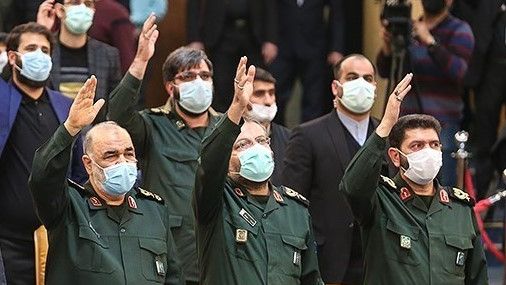
The political deputy in Iran’s presidential office wrote Wednesday that the United States had tempted previous president Hassan Rouhani by offering to delist the IRGC.
Mohammad Jamshidi tweeted that Washington believed the offer to remove the Guards (IRGC) from its list of ‘foreign terrorist organizations’ might draw Rouhani into talks over “regional issues” and Iran’s missile program. The centrist Rouhani left office in August 2021, succeeded by President Ebrahim Raisi, many of whose supporters are critics or opponents of the 2015 nuclear deal, the JCPOA (Joint Comprehensive Plan of Action).
With the US and Iran inching closer together in talks to revive the JCPOA, Raisi may want to project any agreement as more favorable than anything Rouhani would have achieved.
In a briefing in Tehran last week, the outlines of which reached Iran International, Ali Bagheri Kani, Iran’s lead negotiator in nuclear talks, said Iran had rejected a US demand that Iran enter talks over its missile program and regional alliances.
‘Follow on’ talks?
The administration of President Joe Biden, while accepting the original logic of the JCPOA in detaching Iran’s nuclear program from other matters, has said it wants ‘follow on’ deal covering Iran’s missile development and links with groups the US deems ‘terrorists.’ As a candidate running against President Donald Trump, who left the JCPOA in 2018, Biden wrote an op-ed for CNN in 2020 saying the US would under his presidency rejoin the JCPOA “as a starting point for follow-on negotiations.”
While recent days have brought signs of Iran and the US bridging gaps over reviving the JCPOA, the greatest remaining challenge may be agreeing a way forward over the International Atomic Energy Agency (IAEA) probe into unexplained uranium traces found in Iran by inspectors.
Mohammad Marandi, who has acted as a spokesman-cum-advisor for Iranian negotiators, tweeted Wednesday that “no deal will be implemented” unless the IAEA board of governors “permanently” closed these enquiries.
The US, France, Germany, and the United Kingdom in June successfully moved a resolution at the 35-member IAEA board criticizing Iran’s failure to satisfy the agency over the uranium traces, which relate to work carried out before 2003. The US and ‘E3’ argue, as does the IAEA chief Rafael Mariano Grossi, that the issue relates to Iran’s ‘safeguards’ commitments under the Nuclear Non-Proliferation Treaty and is separate from the JCPOA talks.
US: ‘Doing our homework’
Leading Iranian officials, including Raisi, have argued that Iran expects the probe to be dropped as part of restoring the JCPOA. They claim a precedent in the IAEA’s ‘final’ report on Iran’s pre-2003 nuclear work issued in December 2015, some months after the JCPOA was signed.
Marandi in his tweet also suggested he had said for “months” that Iran did not see IRGC delisting as a precondition for success in the talks. It was widely reported in June that Tehran had dropped the demand, which had apparently been raised on the grounds that the Trump administration had listed the IRGC as part of ‘maximum pressure’ after withdrawing the US from the JCPOA in 2018.
A US National Security Council spokesman said Monday that Washington, having received August 15 Iran’s response to European Union proposals on JCPOA revival, circulated August 8, was “currently doing our homework and will respond at an appropriate time and after our internal process is complete.” The spokesman said Washington was encouraged that “Iran appears to have dropped some of its non-starter demands, such as lifting the FTO designation of the IRGC.”
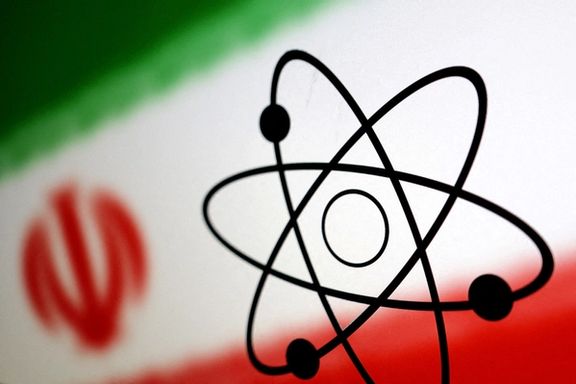
There have been clear signs in recent days that EU proposals of August 8 are closing lingering Washington-Tehran gaps over reviving the 2015 Iran nuclear deal.
European Union officials called these ideas a “final text,” and then reacted with cautious optimism to an Iranian response made August 15.
Ned Price, the United States State Department Spokesman, referred Monday to the “latest versions of the text the EU had circulated,” suggesting the text had been amended. Price said the latest versions did not include the removal of Iran’s Revolutionary Guards from the US list of ‘foreign terrorist organizations.’ Tehran reportedly demanded earlier in talks the withdrawal of the designation, made by President Donald Trump in 2019 in the context of ‘maximum pressure’ introduced after the US left the nuclear deal in 2018.
As reported Tuesday, a senior US official told Reuters news agency Monday that Iran had now “basically dropped the main hang-ups to a deal.”
Crossing the Rubicon
“We think they have finally crossed the Rubicon and moved forward towards possibly getting back into the deal on terms that President [Joe] Biden can accept,” the official told Reuters. “If we are closer today, it’s because Iran has moved. They conceded on issues they have been holding onto from the beginning.”
The official added that the US was “studying” Iran’s response: “We’ll get back to them soon.”

While accusing Washington of delay since Tehran’s input August 15, Iranian officials have suggested the US has made significant concessions. This may help to placate less strident Iranian opponents of the 2015 deal, the JCPOA (Joint Comprehensive Plan of Action).
Josep Borrell, the EU foreign policy chief, said Wednesday that while “most” countries agreed with the EU text, “I still don’t have the answer from the United States.”
The trickiest issue on which to agree wording over the text restoring the JCPOA may be enquiries by the International Atomic Energy Agency (IAEA) into uranium traces found in Iranian sites linked to pre-2003 work. While the agency would monitor a restored 2015 deal, it insists that its enquiry into the uranium relates to Tehran’s basic commitments under the Nuclear Non-Proliferation Treaty rather than JCPOA.
Iran, on the other hand, has pointed to the precedent of 2015 when, shortly after the JCPOA was signed, the agency published a ‘final’ report on Tehran’s pre-2003 work. Iran argues the probe was revived only because of allegations made by Israel based on documents supposedly removed from Iran by Israeli agents.
‘Main obstacle’
Nour News, linked to Iran’s Supreme National Security Council, Tuesday objected to “political approaches” by IAEA chief Raphael Mariano Grossi, calling him the “main obstacle to the finalization of the Vienna talks, along with the Zionist regime.”
The quid pro quo of JCPOA restoration boils down to which US sanctions violate the agreement, and how Iran would return to JCPOA limits the nuclear activities it has expanded and refined since 2019. With both sanctions and nuclear work technical as well as political, gaps between Washington and Tehran have not been bridged in 16 months of talks, largely in Vienna between Iran and six world powers, and bilaterally between Iran and the US in Qatar in June.
A second US official quoted by Reuters said that under the American understanding of JCPOA restoration, limits on the Iranian nuclear program would extend to “at least six months” the ‘break out’ time required to assemble a crude weapon should Iran decide to do so.